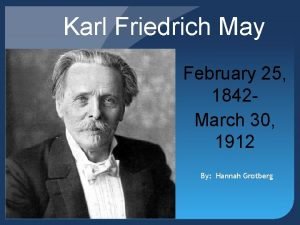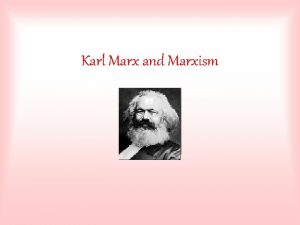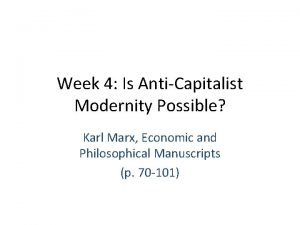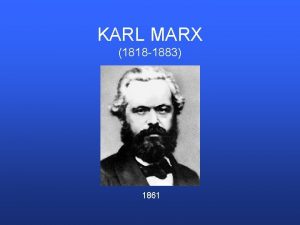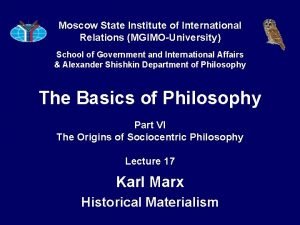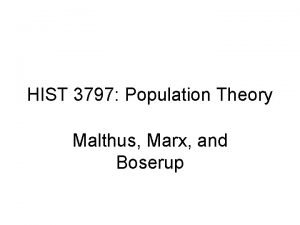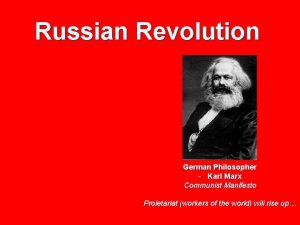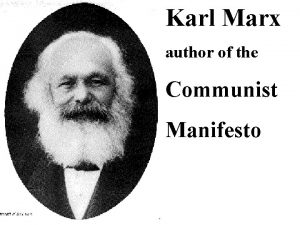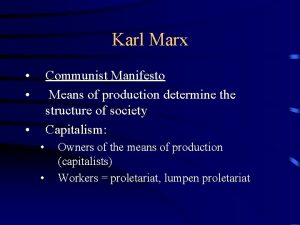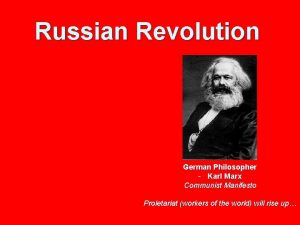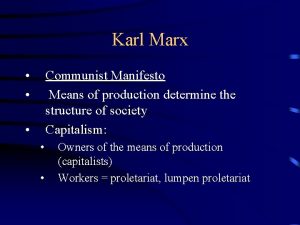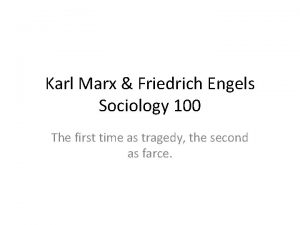Karl Marx Friedrich Engels Manifesto of the Communist
























- Slides: 24

Karl Marx, Friedrich Engels: Manifesto of the Communist Party



Rousseau + Smith + Hegel - Kant = Marx

The genius of Marx consists precisely in his having furnished answers to questions already raised by the foremost minds of mankind. His doctrine emerged as the direct and immediate continuation of the teachings of the greatest representatives of philosophy, political economy and socialism. … It is the legitimate successor to the best that man produced in the nineteenth century, as represented by German philosophy, English political economy and French socialism. — Lenin, “The Three Sources and Three Component Parts of Marxism” (1913)

The philosophers have only interpreted the world in various ways; the point, however, is to change it. — Marx, Theses on Feuerbach (1845)



The philosophy of Marxism is materialism. Throughout the modern history of Europe, and especially at the end of the eighteenth century in France, where a resolute struggle was conducted against every kind of medieval rubbish, against serfdom in institutions and ideas, materialism has proved to be the only philosophy that is consistent, true to all the teachings of natural science and hostile to superstition, cant and so forth. — Lenin, “The Three Sources and Three Component Parts of Marxism”

But, if constructing the future and settling everything for all times are not our affair, it is all the more clear what we have to accomplish at present: I am referring to ruthless criticism of all that exists, ruthless both in the sense of not being afraid of the results it arrives at and in the sense of being just as little afraid of conflict with the powers that be. — Marx, “Letter to Arnold Ruge” (1843)

Early socialism … was utopian socialism. It criticized capitalist society, it condemned and damned it, it dreamed of its destruction, it had visions of a better order and endeavored to convince the rich of the immorality of exploitation. But utopian socialism could not indicate the real solution. It could not explain the real nature of wage-slavery under capitalism, it could not reveal the laws of capitalist development, or show what social force is capable of becoming the creator of a new society. — Lenin, “The Three Sources and Three Component Parts of Marxism”

Classical political economy, before Marx, evolved in England, the most developed of the capitalist countries. Adam Smith and David Ricardo, by their investigations of the economic system, laid the foundations of the labor theory of value. Marx continued their work; he provided a proof of theory and developed it consistently. — Lenin, “The Three Sources and Three Component Parts of Marxism”

Owing to the extensive use of machinery and the division of labor, the work of the proletarians has lost all individual character, and consequently, all charm for the workman. He becomes an appendage of the machine, and it is only the most simple, most monotonous, and most easily acquired knack, that is required of him. Hence, the cost of production of a workman is restricted, almost entirely, to the means of subsistence that he requires for his maintenance, and for the propagation of his race. But the price of a commodity, and therefore also of labor [power], is equal to its cost of production. In proportion, therefore, as the repulsiveness of the work increases, the wage decreases. Nay more, in proportion as the use of machinery and division of labor increases, in the same proportion the burden of toil also increases, whether by prolongation of the working hours, by increase of the work exacted in a given time, or by increased speed of the machinery, etc. (479)

But Marx did not stop at eighteenth-century materialism: he developed philosophy to a higher level, he enriched it with the achievements of German classical philosophy, especially of Hegel’s system, which in its turn had led to the materialism of Feuerbach. The main achievement was dialectics, i. e. , the doctrine of development in its fullest, deepest and most comprehensive form, the doctrine of the relativity of the human knowledge that provides us with a reflection of eternally developing matter. … Marx deepened and developed philosophical materialism to the full, and extended the cognition of nature to include the cognition of human society. His historical materialism was a great achievement in scientific thinking. — Lenin, “The Three Sources and Three Component Parts of Marxism”

My dialectical method is not only different from the Hegelian, but is its direct opposite. To Hegel, the life process of the human brain, i. e. , the process of thinking, which, under the name of “the Idea, ” he even transforms into an independent subject, is the demiurgos of the real world, and the real world is only the external, phenomenal form of “the Idea. ” With me, on the contrary, the ideal is nothing else than the material world reflected by the human mind, and translated into forms of thought. — Marx, Capital, “Afterword to the Second German Edition, ” 1873

The weapon of critique cannot, of course, replace the critique of the weapon, material force must be overthrown by material force; but theory also becomes a material force as soon as it has gripped the masses. — Marx, “Contribution to the Critique of Hegel’s Philosophy of Right”

The history of all hitherto existing society is the history of class struggles. (473)

Freeman and slave, patrician and plebeian, lord and serf, guild-master and journeyman, in a word, oppressor and oppressed, stood in constant opposition to one another, carried on an uninterrupted, now hidden, now open fight, a fight that each time ended, either in a revolutionary reconstitution of society at large, or in the common ruin of the contending classes. (473 -474)

Our epoch, the epoch of the bourgeoisie, possesses, however, this distinctive feature: it has simplified class antagonisms. Society as a whole is more and more splitting up into two great hostile camps, into two great classes directly facing each other: Bourgeoisie and Proletariat. (474)

The bourgeoisie has at last, since the establishment of Modern Industry and of the world-market, conquered for itself, in the modern representative state, exclusive political sway. The executive of the modern State is but a committee for managing the common affairs of the whole bourgeoisie. (475)

It has accomplished wonders far surpassing Egyptian pyramids, Roman aqueducts, and Gothic cathedrals; it has conducted expeditions that put in the shade all former Exoduses of nations and crusades. (476)

What the bourgeoisie, therefore, produces, above all, is its own grave-diggers. Is fall and the victory of the proletariat are equally inevitable. (483)

A spectre is haunting Europe — the spectre of Communism. (473)

Workers of the world, unite!
 Communist utopia
Communist utopia Communist manifesto
Communist manifesto Communist manifesto penguin
Communist manifesto penguin Karl friedrich gauss
Karl friedrich gauss Karl friedrich may
Karl friedrich may Socialismo
Socialismo Andres lazzerini muerte
Andres lazzerini muerte Animal farm is an allegorical satire on
Animal farm is an allegorical satire on Das kapital sparknotes
Das kapital sparknotes Marx
Marx Jenny von westphalen
Jenny von westphalen Karl marx
Karl marx Karl marx
Karl marx Karl marx
Karl marx Marx il lavoro
Marx il lavoro Alienação karl marx
Alienação karl marx Alienação karl marx
Alienação karl marx Karl marx materialist conception of history
Karl marx materialist conception of history Alienação marx
Alienação marx Marxian theory
Marxian theory Estrutura e superestrutura
Estrutura e superestrutura Whos adam smith
Whos adam smith Animal farm karl marx
Animal farm karl marx Super estrutura
Super estrutura Karl marx population theory
Karl marx population theory




